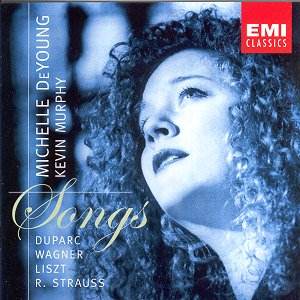The American soprano Michelle de Young has already
sung Fricka at the Met under Levine and at the RAH for Haitink, so this
‘debut’ series is beginning to turn into something of a misnomer when
EMI describes the artists they promote as ‘on the brink of major international
careers’. Some of these careers are as long as your arm, giving rise
to the thought that the only direction open to them is down rather than
up, and Miss De Young’s highly impressive CV is no exception. Happily,
however, there is no cause for such pessimism, for listening to her
voice is sheer joy, sensitively warm in expression and laced with intelligent
phrasing as it is. One could argue that the styles presented here, confined
to the latter half of the 19th century, are somewhat too
similar, but that belies their attraction, especially given Kevin Murphy’s
exquisitely shaped and balanced accompaniments.
Of the four composers she has chosen, only Henri Duparc,
the least familiar, wrote specifically for the voice in the Lieder format.
His was a strange life of 85 years, though he abandoned composition
at 36. The five songs here are not part of a cycle but range in emotion
from dignified mourning (track 5: 0’37") to controlled passion
(track 1: 1’35"). Duparc was always meticulous in choosing his
texts, highly superior poets all, while Wagner’s Wesendonck Lieder,
sketches for Tristan written for his mistress Mathilde in the
mid-1850s, use her own gifted verses. De Young brings a ruminating quality
of mood and sensitive poise to Im Treibhaus, with Murphy immaculately
sustaining the tension created by the slow tempo (track 8: 2’40").
Liszt’s Jeanne d’Arc au bûcher takes a biographical journey
through the Maid of Orleans’ life from youth to martyrdom, a thumb-nail
operatic sketch to which De Young’s voice takes with consummate ease
(track 11: 2’42"). To conclude, Strauss’s lush melodies are delivered
with a marvellous sweeping arc of line (track 13: 1’28") in a couple
of familiar Lieder. An impressive disc despite the absence of any light
touches or swifter tempi to alleviate the ‘Angst’ which pervades all
the songs chosen.
Christopher Fifield
